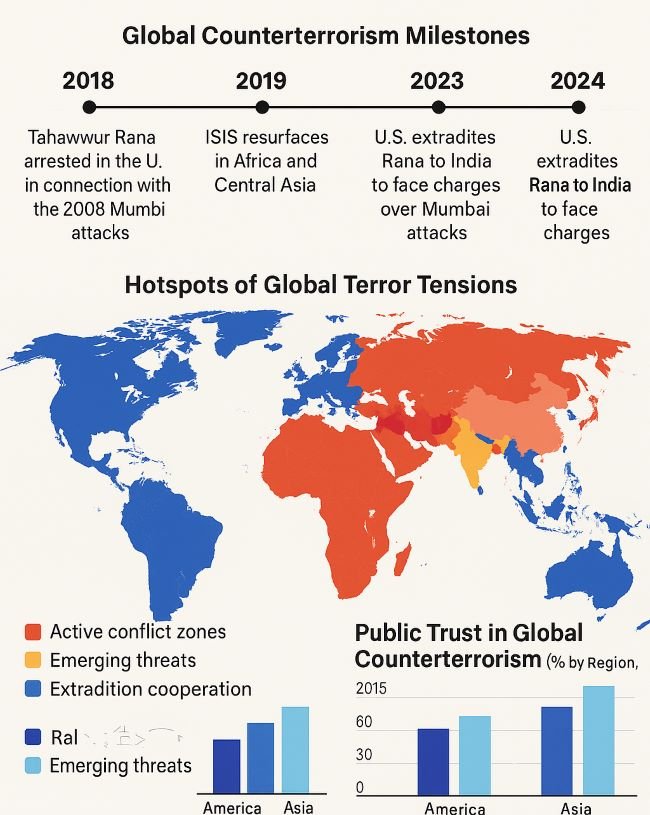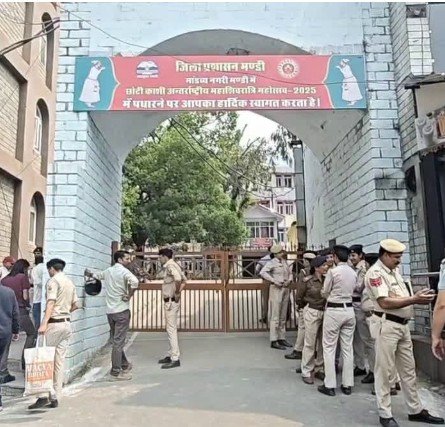
Global Terrorism Under Watch: Tahawwur Rana’s Extradition Sends a Strong Message
- Breaking NewsHEADLINESNATIONOpinionSnippets
- April 10, 2025
- No Comment
- 53
Saptrishi Soni:
In a pivotal moment for international counterterrorism efforts, the United States has extradited Tahawwur Rana to India—an accused conspirator in the devastating 2008 Mumbai attacks that claimed 166 lives. As the world grapples with escalating terror threats from multiple fronts—ranging from South Asia to the Middle East—Rana’s extradition underscores a growing global consensus: there is no safe haven for terrorism.
Who Is Tahawwur Rana?
Born in Chichawatni, Pakistan, in 1961, Rana served as a military doctor in the Pakistan Army before immigrating to Canada in the late 1990s. By 2001, he was a naturalized Canadian citizen, later moving to the United States where he launched a chain of immigration service offices.
But Rana’s story took a dark turn. He maintained close ties with David Headley, the man who scouted locations for the 26/11 Mumbai attacks. According to Indian investigative authorities and U.S. court records, Rana helped Headley set up a business front in Mumbai that facilitated reconnaissance missions for the attack. He was also linked to a foiled terror plot against the Danish newspaper Jyllands-Posten for publishing cartoons of the Prophet Muhammad.
Arrested in the U.S. in 2009, Rana faced legal battles for years before exhausting all appeals against extradition. His arrival in India, now imminent, is not just the culmination of a legal process but a statement of international cooperation against terrorism.
A Global Climate of Fear
Rana’s extradition comes amid a volatile global landscape, where terrorism is no longer a regional issue—it is a transnational threat. The attacks in Moscow’s Crocus City Hall, the resurgence of ISIS factions, the Houthi disruptions in the Red Sea, and the war in Gaza have all signaled one stark truth: the global counterterrorism framework must evolve, and swiftly.
The United States’ decision to hand over Rana is symbolic. It communicates a no-tolerance policy towards individuals accused of terrorism, regardless of where they reside or how long they’ve evaded prosecution. It’s also a strategic gesture, particularly in the wake of America’s increasing involvement in trying to resolve the Israel-Gaza conflict and curbing Iran-backed proxy activities.
Why Rana’s Extradition Matters for India—and the World
For India, bringing Rana to justice is more than a legal win—it’s a matter of national closure. The 2008 Mumbai attacks were India’s 9/11, not just in scale, but in emotional trauma. The event shook the world’s faith in urban security and exposed deep vulnerabilities in international intelligence cooperation. Rana’s trial in India could open new leads, expose sleeper cells, and offer a detailed account of the plot’s funding and execution.
For the global community, the case sets a precedent. It affirms that bureaucratic red tape will not be a shield for the accused when terrorism is involved. It also reinforces that democracies are willing to collaborate on matters of justice—especially when innocent lives are at stake.
The U.S. Role and the Bigger Picture
President Joe Biden has made counterterrorism and Middle East stabilization cornerstones of his foreign policy agenda. The White House’s firm message to Iran—to cease backing the Houthis and other proxy militias—goes hand-in-hand with moves like Rana’s extradition. The optics are clear: the U.S. is actively participating in dismantling the infrastructure of global terror.
As America pushes for a ceasefire in Gaza and urges restraint from Tehran, the Rana case also provides diplomatic leverage. It showcases the U.S. not just as a power broker, but as a justice enforcer—willing to take tough calls when international norms are threatened.
A Call for United Global Action
Rana’s extradition should be a rallying cry for world leaders to reinforce cross-border intelligence sharing, plug legal loopholes, and crack down on digital financing of terrorism. As terror tactics evolve—through lone-wolf attacks, cyber radicalization, and proxy warfare—the global response must be equally nimble and united.



